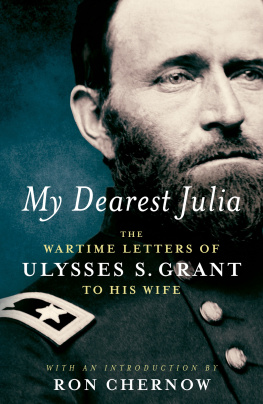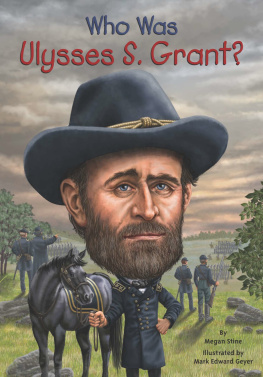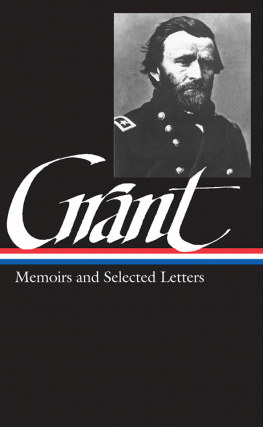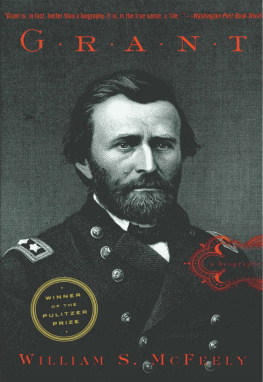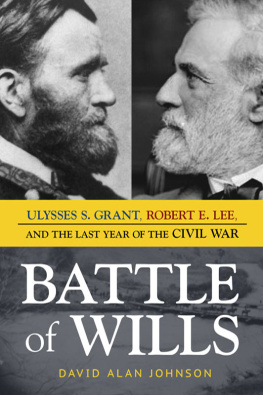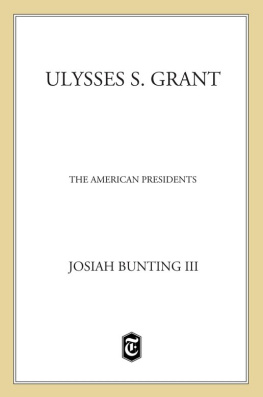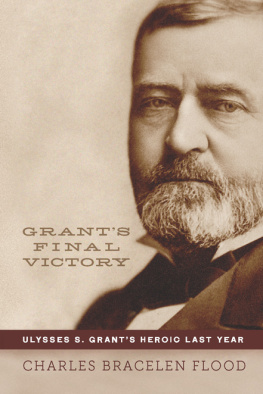Ulysses S. Grant - My Dearest Julia: The Wartime Letters of Ulysses S. Grant to His Wife
Here you can read online Ulysses S. Grant - My Dearest Julia: The Wartime Letters of Ulysses S. Grant to His Wife full text of the book (entire story) in english for free. Download pdf and epub, get meaning, cover and reviews about this ebook. year: 2018, publisher: Library of America, genre: Home and family. Description of the work, (preface) as well as reviews are available. Best literature library LitArk.com created for fans of good reading and offers a wide selection of genres:
Romance novel
Science fiction
Adventure
Detective
Science
History
Home and family
Prose
Art
Politics
Computer
Non-fiction
Religion
Business
Children
Humor
Choose a favorite category and find really read worthwhile books. Enjoy immersion in the world of imagination, feel the emotions of the characters or learn something new for yourself, make an fascinating discovery.
- Book:My Dearest Julia: The Wartime Letters of Ulysses S. Grant to His Wife
- Author:
- Publisher:Library of America
- Genre:
- Year:2018
- Rating:4 / 5
- Favourites:Add to favourites
- Your mark:
- 80
- 1
- 2
- 3
- 4
- 5
My Dearest Julia: The Wartime Letters of Ulysses S. Grant to His Wife: summary, description and annotation
We offer to read an annotation, description, summary or preface (depends on what the author of the book "My Dearest Julia: The Wartime Letters of Ulysses S. Grant to His Wife" wrote himself). If you haven't found the necessary information about the book — write in the comments, we will try to find it.
My Dearest Julia: The Wartime Letters of Ulysses S. Grant to His Wife — read online for free the complete book (whole text) full work
Below is the text of the book, divided by pages. System saving the place of the last page read, allows you to conveniently read the book "My Dearest Julia: The Wartime Letters of Ulysses S. Grant to His Wife" online for free, without having to search again every time where you left off. Put a bookmark, and you can go to the page where you finished reading at any time.
Font size:
Interval:
Bookmark:
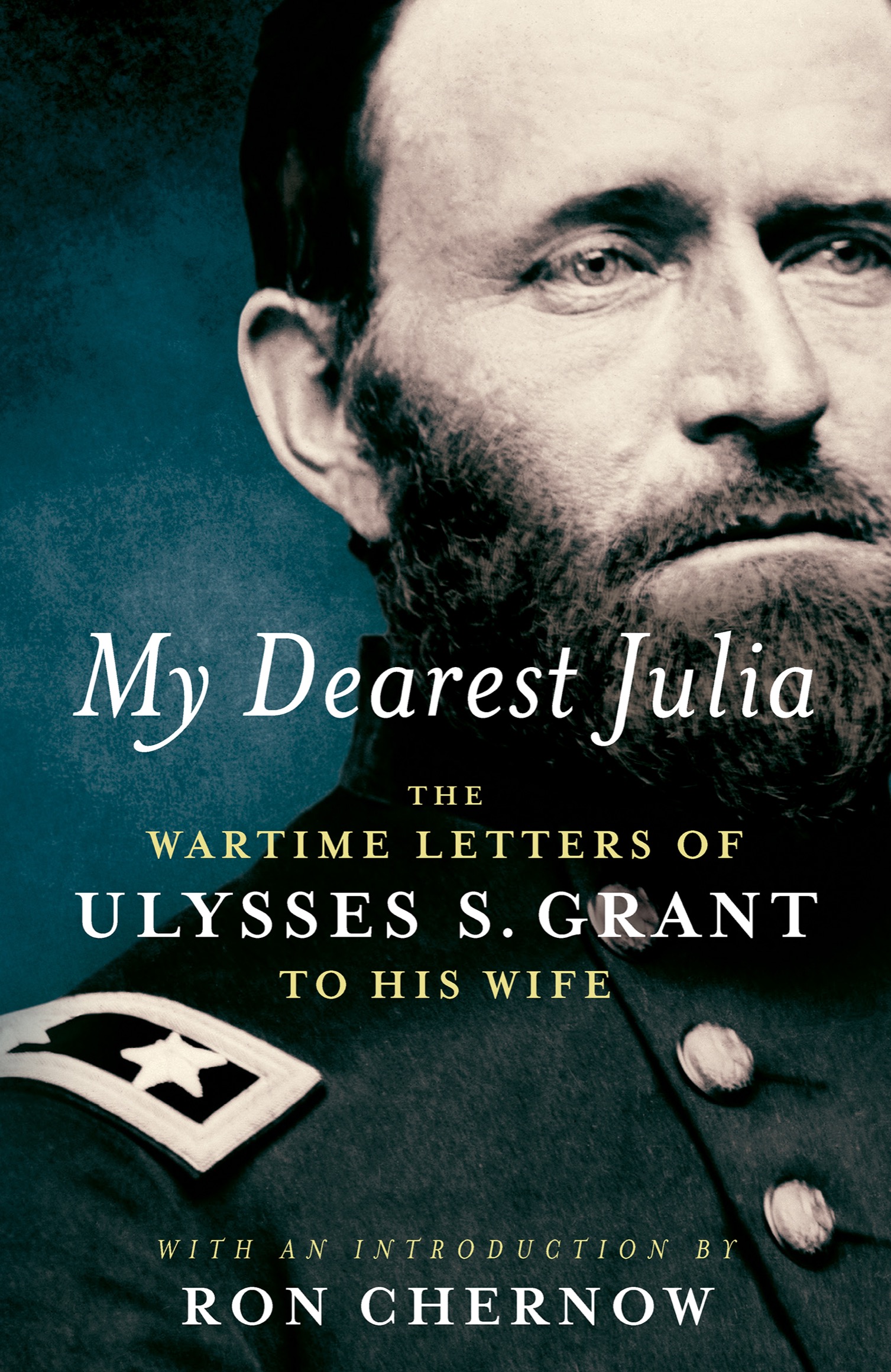
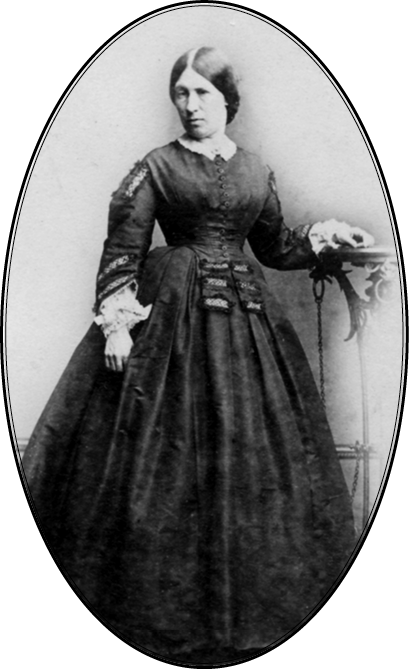
My Dearest Julia
THE
WARTIME LETTERS OF
ULYSSES S. GRANT
TO HIS WIFE
WITH AN INTRODUCTION BY
RON CHERNOW

LIBRARY OF AMERICA
Special Publication
MY DEAREST JULIA
Introduction, notes, and volume compilation copyright 2018 by
Literary Classics of the United States, Inc., New York, N.Y.
All rights reserved.
Published in the United States by Library of America.
www.loa.org
No part of this book may be reproduced in any manner whatsoever without the permission of the publisher, except in the case of brief quotations embodied in critical articles and reviews.
All texts published by arrangement with the Ulysses S. Grant Association.
Frontispiece photograph of Julia Dent Grant, c. 185561. Courtesy of the National First Ladies Library.
Distributed to the trade in the United States by Penguin Random House Inc. and in Canada by Penguin Random House Canada Ltd.
Library of Congress Control Number: 2018935011
eISBN 9781598535907
LETTERS
Part I
June 4, 1844 to February 2, 1854
Part II
May 1, 1861 to April 25, 1865
by Ron Chernow
W HEN ULYSSES S. GRANT wrote his Personal Memoirscertainly the most brilliant military memoirs in American lettersduring the final year of his life, those who knew him most intimately were least surprised by their exceptional literary merit. In their line, there is no higher literature than those modest, simple memoirs, insisted Mark Twain (Samuel Clemens), who served as their publisher. Grant had long prided himself on his writing. During the Civil War, he had composed his own military orders, sometimes dashing off several dozen at a rapid clip in a terse, letter-perfect style. And as president he had drafted his addresses and messages in the days before professional speechwriters became fixtures in the White House.
So durable has been the stereotype of Grant as a stoic and laconic soul that most readers will be struck by the tender tone of the letters he wrote to his wife, Julia, eighty-five of which have now been collected in this fine volume by the Library of America editors. However spare in style, they candidly portray Grants emotional state, showing his remarkable evolution from an insecure young soldier to a capable, self-confident general. A man so reserved in public needed a private outlet for his feelings, and his correspondence with Julia was the ideal repository for these confessions.
After graduating from West Point in 1843, Grant was posted as a second lieutenant to Jefferson Barracks near St. Louis, where he met Julia Dent, sister of a West Point roommate. It was the sort of classic mismatch that, through loves strange alchemy, sometimes yields marital bliss. Grant had grown up in several small rural towns in southwest Ohio, the son of straitlaced Methodist parents, who frowned on dancing, drinking, and card-playing. Because the Dents owned a few dozen slaves, the abolitionist Grants scorned them as lazy and dissolute. Nonetheless, after a prolonged engagement, complicated by the disapproval of Julias father, the couple married in St. Louis in August 1848. The Grants registered their disapproval by boycotting the wedding altogether.
Long periods of enforced separation marked the courtship and early marriage of Ulysses and Julia Grant, producing an abundant trove of letters from husband to wife. Spelling was a mystery that Grant somehow never mastered and he was no less challenged by grammar, but one can already spy the rudiments of his mature prose style during their four-year courtship, when Grant was stationed in Louisiana and Texas before fighting in Mexico. These early letters have a charming, breathless quality as Grant pines for Julias presence. In messages heavy with youthful yearning, he tells her how much anxiety and suspense he feels as he awaits her letters. The lovelorn soldier assures her that, true to a mutual pledge they made, he thinks of her every day at sunset. At that time I am most always on parade and no doubt I sometimes appear very absent minded. Grant comes across as a chaste, almost prudish young man, incorrigibly naive, with none of the rough swagger of most soldiers. No one is so capable of giving good advice as a lady, he informs Julia without apparent irony, for they always practice just what they would preach.
During their years apart, Grant seemed cruelly suspended in midair, unsure of Julias intentions. He treasured her letters, hung on her every word, and repeatedly chided her for not writing more often. (We dont know why Julias letters, fewer in number, have vanished, leaving us with only his side of the correspondence.) Reliant on Julias love, Grant remained uncertain of its continuance, often lapsing into a sad quandary. Your letters always afford me a great deal of happiness because they assure me again that you love me still... , he tells her from Texas in a typical passage. He constantly fished for reassurances, alerting Julia on one occasion that he had heard a disturbing rumor that I have a dangerous rival in Missouri, and that you do not intend to write to me any more.
While in Louisiana and coastal Texas, Grant inhabited a small, circumscribed world and his intensely personal letters were mostly taken up with daydreaming about Julia. Then his regiment penetrated deep into enemy territory, opening his eyes to a larger reality. As his regiment crossed Texas, he had surrendered to the pristine beauty of the countryside, betraying a hitherto unseen sensitivity to nature. The whole of this country is the most beautiful I ever have seen... , he reported. One senses the wanderlust of a young man who, having grown up in provincial Midwestern towns, now experienced a brand-new universe of sensations in Mexico.
Before he experienced the terror of combat, Grant seemed, in many ways, indistinguishable from other young soldiers aching for home. Then, as the opposing armies clashed, he demonstrates a coolness under fire that foretold his future success in the Civil War. There is no great sport in having bullets flying about one in evry direction, he informs Julia, but I find they have less horror when among them than when in anticipation. He explained to her that he had felt no tremor of fear until a cannonball whizzed right past him, knocking off the under-jaw of Captain John Page as he stood nearby. Where others succumbed to terror and confusion, Grant exhibited a preternatural calm and sharp mental focus in battle.
For Grant, the horrors of warfare paled beside the atrocious conduct he witnessed off the battlefield. As he contemplated such action, a fundamental decency surfaced in him. In Matamoros, he bristled at the shameful murder of Mexican civilians by American troops. Some of the volunteers and about all the Texans seem to think it perfectly right to impose upon the people of a conquered City to any extent, and even to murder them where the act can be covered by the dark. And how much they seem to enjoy acts of violence too! Where warfare coarsened the sensibility of other soldiers, it brought out in Grant a latent nobility and stubborn sense of fair play. He refused to neglect the human cost of war. After victorious American troops marched into Mexico City, he apprises Julia that the most astonishing victories have crowned the American arms. Then he rushes to caution her: But dearly have they paid for it! The loss of officers and men killed and wounded is frightful. During the American occupation of the city, Grant brooded on the blatant inequalities of Mexican society, proving a thoughtful observer with an instinctive sympathy for the underdog. The rich keep down the poor with a hardness of heart that is incredible.
Font size:
Interval:
Bookmark:
Similar books «My Dearest Julia: The Wartime Letters of Ulysses S. Grant to His Wife»
Look at similar books to My Dearest Julia: The Wartime Letters of Ulysses S. Grant to His Wife. We have selected literature similar in name and meaning in the hope of providing readers with more options to find new, interesting, not yet read works.
Discussion, reviews of the book My Dearest Julia: The Wartime Letters of Ulysses S. Grant to His Wife and just readers' own opinions. Leave your comments, write what you think about the work, its meaning or the main characters. Specify what exactly you liked and what you didn't like, and why you think so.

